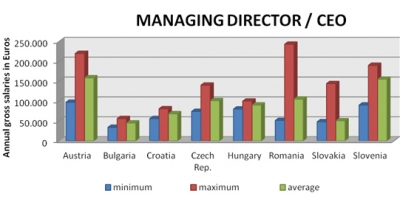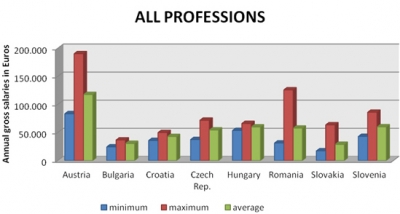Our Slovenian partner, Dr. Pendl & Dr. Piswanger D.O.O. has conducted a research regarding Top / Middle Management Salaries in countries of Central and South-Eastern Europe.
Middle Management Salary Survey in countries of Central and South-Eastern Europe
During the crisis, manager's salaries are a hot topic. In fact we could say that it would be difficult to find a more exciting topic at this time, it raises the question of whether or not they get paid too much for what they do. In the past year, there was a hot debate about whether top managers are paid too high, given the relatively low economic growth. It seems that this topic is present in Austria for several years. Indeed, data from the survey show that the relationship between salaries of CEO's compared with salaries from directors are close-up significantly more than in Slovenia. The relation in Austria is 1,34, while in Slovenia this relation is 2.5.
We also noticed that the ratio between the earnings of the Managing Directors and Middle management in Slovenia decreased. In 2007 we noted that the managing directors earn 3 times more, but today this ratio is only 2.5. We also found that in 2011 the salaries of the Managing Directors decreased by two percentage points less than the salaries increased for middle managers.
Remuneration packages of the CEO's in different companies and even countries is generally bound by following important principles: accountability for achieving the strategic objectives of the company, responsibility for effective financial management and ensuring transparency of operations. In general, the salary of managers comprises of a fixed part, a variable part (which is dependent on the achievement of other objectives or set criteria), short-term rewards tied to achieving annual business goals, long term incentives tied to long-term success of the company and paid in the form of shares or share options, different bonuses and privileges (insurances, company car, parking space, the membership of various associations, specialized trainings, etc..).
Still little is known about rewarding systems of managers in Southeast and Central Europe. Till 2002, salaries of top managers were kept a secret in Slovenia. In 2002 a law was adopted, which prescribes that a public limited liability or shareholding company must annually provide information on the annual total remuneration for management. This information unfortunately only reveals the average income, but not the individual salary of top management. In various countries of CSEE, these systems are differently arranged.
In the international advisory group, Dr. Pendl & Dr. Piswanger, who works in human resources management consulting in the countries of Central and South-Eastern Europe, we have a real data on salaries of managers in the countries of Austria, Bulgaria, Czech Republic, Croatia, Hungary, Romania, Slovakia and Slovenia.
Given the overall of average wages first place in the region occupies Austria, which is probably not unusual; since Austria is seen as one of the top 10 stable economies in the world.
As we can see, the average wages of Managing Directors of mid-sized companies, Slovenia takes second place in the region, behind Austria's Managing Directors. The average salary of CEO's in Austria amounts to € 158.50, € 155.000 in Slovenia, in Romania € 105.000, in Czech Republic € 101.000, € 90.000 in Hungary, € 68.000 in Croatia, in Slovakia € 50.400 and finally in Bulgaria to € 45.000.

Also according to the average height of all CEO's salaries on the second leadership level (€ 60.000), Slovenia and Hungary share the second place. Even here the first place is taken by the Austrians, who have an average managerial salary € 117.600. On the fourth place is Romania with average salary in amount of € 57.800, followed by Czechs with € 54.500, Croatians with € 42.800, the lowest salaries are in Bulgaria and Slovakia and range between € 28.800 and € 30.500.

In Slovenia, the average salaries of Middle managers achieve 39% of average salaries of Managing Directors. Looking at the same rate in other countries: in Austria, this ratio is 74%, 68% in Bulgaria, Hungary 67%, 63% in Croatia, 56% in Slovakia, Romania 55% and Czech Republic 54%.
Situation on the labour market in Central and South-Eastern Europe
In Czech Republic, the most difficult economic situation was in 2009/2010. The year 2011 has showed up an improvement in the economy, but the situation on the labour market is still today quite "nervous". Companies do not hire, they are trying to make lean organizations, salary increases in 2011 / 2012 are frozen and managers are afraid of losing their jobs.
| In more developed countries of Central and Southeastern Europe, the managers fear for their jobs. |
Also in Hungary, a lot of companies had to reorganize and dismiss a large number of managerial positions. The international corporations have integrated the local management structures to the regional level and with this; a loss of several managerial positions in Hungary took place. The market has a small amount of new positions. Even in the case of natural departures (retirement, consensual termination) it often happens that the responsibilities of those jobs gets spread among other positions, so also in these cases, no new employment will take place.
Croatia estimates the labour market in Croatia will be this year very exciting for several reasons. One reason is the change of government, also the market, due to lower demand by employers and facilitated policy layoffs, turned in favour of employers in the labour market.
In Bulgaria, the recession reduces the number of employees, as some companies have failed to reach their targets and closed their operations. The result is that there are more managers who are actively seeking employment.
In 2009 and 2010 were also times of drastic changes in Romania, the year 2011 was the year of consolidation, which was in contrast to previous years, at managerial levels fewer layoffs.
The changes of salaries in 2011
The countries in 2009 and 2010, when there was the biggest economic crisis, implemented several salaries freeze. In 2011 the situation has improved, so the salaries in the region increased slightly. Increase of salaries in the countries of Central and South-Eastern Europe were on average 3,9%, but this figure conceals the relative variations across countries. The largest salaries increases were recorded in Bulgaria (5%) and Romania (5,5%). Rise in Slovakia was 3,4%, 3,2% in Czech Republic, Croatia 2,9%, while in Slovenia, 3,3%. The increases of salaries are still above the increase in the rest of Europe. Companies are increasingly dealing with the introduction of other tools and systems which will motivate their managers, and not using the remuneration as the key motivating tool. Companies in this region, therefore, are only now starting to use the whole range of soft incentive systems and tools, which Western Europe has been used for many years.
| Salaries growth forecasts for 2012 barely cover projected inflation in individual countries. |
Salaries growth forecast for 2012
In central and South-Eastern Europe provided an average increase in salaries of 3.9%. Forecasts for 2012 only cover the projected inflation in individual countries. In the countries of Central and South Eastern Europe is expected to raise salaries as a percentage of managerial salaries, which are almost identical to the annual inflation rate: 5.5% in Romania, Bulgaria 5%, 4% in Hungary, Slovakia 3.7%, Croatia 3.5%, Slovenia 3, 4%, 3.2% in Czech Republic and Austria 3%.
The highest projected growths of salaries in Eastern Europe are outside the analyzed countries, on the markets of Russia, Ukraine and Turkey, which provide growth between 7.8 and 10%.
The average of the variable part of salary of top managers in the region
The highest bonus is received in Hungary, which is between 25 - 30% of annual gross salary. Bulgaria and Slovenia have similar bonuses, amounted to between 20 and 30%, in Romania the average is 22%, in Slovakia between 15-25%, 20% in the Czech Republic and in Croatia between 15 - 20%.
| "Golden parachutes are more controversial" |
Benefits and bonuses of top managers in the region
Most frequent benefits of top managers are a company car for private use and mobile phone. These two advantages belong to the top managers in all countries in the region.
Very frequent advantage is also receiving payment of additional voluntary pension insurance - this is being paid in companies in Czech Republic, Croatia, Bulgaria, Romania and Slovenia. Superior health insurance is often offered in Czech Republic, from time to time in Croatia and in Romania.
In Bulgaria, it is often also fund additional formalized training and tuition for the children. In Croatia, Austria and Slovenia are also several options available.
Recently, the "golden parachute" became increasingly controversial. These are special provisions in employment contracts of top managers, which, in the case of termination of employment bring different benefits. These include a huge severance pay at employment termination, even if they are dismissed because of mistakes that can cost companies a lot of money and new dismissals of operative staff. The golden parachutes include also profit sharing and a variety of other stimulations, such as shares and options.







